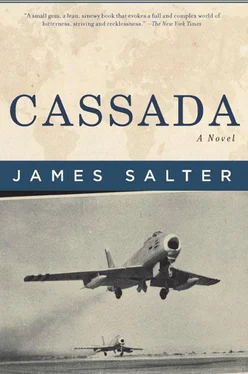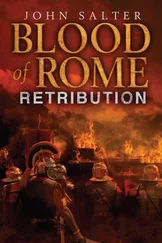“He went into town.”
“Already?”
Dumfries came in after a while and sat beside Phipps.
“She’s a nice girl,” he said.
“The cashier? What makes you think she’s nice?”
“I’ve talked to her. I just think she’s nice. Most of these fellows don’t even know what a decent German girl is like.”
“Some of them know.”
Dumfries began to talk about the maid they had, he and Laurie, how nice she was. He described her habits, her love of cleanliness and visits to her parents. She was very shy. As Phipps half-listened he suddenly realized what it was about Dumfries: nothing bored him. And calling the tight-skirted cashier, owner of a siren’s body, nice. She may have been a lot of things but nice was not one of them. Cassada was probably already driving to town. Phipps wished he’d gone, too.
In the early morning, before daylight, Isbell walked alone through the hangar past the planes being repaired, broken in two by the mechanics, the lines hanging loose, bleeding black into drip pans. The hangar lights were on though no one yet was working.
In the ready room Wickenden was posting his schedule as the members of his flight sat watching. Isbell stood near his shoulder for a few moments, unnoticed, then took the rag as Wickenden was writing and rubbed out the leader of the first two, Phipps, replacing it with his own name next to Cassada’s. Wickenden didn’t say anything. He kept on writing. Cassada sat stretched out in unconcern, his neck on the back of a chair and his legs in the G-suit chaps resting straight with only his heels touching the floor, doing everything he could not to look like the others. He’d watched Isbell without moving his head, out of the corner of his eye. It was just the way Godchaux sat.
Isbell said nothing to him but went into the next room, picked up his things and took them out to the ship. To the east it was becoming light, a great, forlorn light that seemed to sweep in from the steppes. The air was still, a sea-like calm. He laid his parachute against one of the wheels and began to walk around the airplane, starting at one wing and then following the fuselage to the tail, running a hand over the chilly skin as he went, sometimes patting it like a horse as if to calm it. He was entering the realm of his true authority. He had barely finished the walk-around when the horn sounded. He saw Cassada running out the door, pulling on his gloves as he went, the blare of the horn flooding around him, the crewmen coming after.
Quickly Isbell pulled on his parachute and climbed into the cockpit, fumbling for the safety belt buckles. The horn kept blowing in panic. The high whine of the engines starting began.
Off on the first scramble, early in the day, no finer time, cold and quiet, the smoke coming straight up from the towns. Munich was blue, deserted. The roads seemed dusted with chalk. The trains were running empty, the streetcars.
At altitude it was silent. The controller directed them north. Serene, pure as angels they flew. At Ingolstadt some clouds began, a thin, floating fence that went up towards Berlin, grey as a river. Cassada was in position just where he was meant to be, off to the left, looking past Isbell towards the sun and the unknown east. It was there the enemy lay, sometimes inactive, sometimes flying themselves on a parallel course waiting for the slightest violation of the invisible border, or lurking below the contrails, unseen. The controller would call them out but not always, and when the ground was covered by clouds there was always the slight chance of error, a mistake in position or which radar blip was which. The threat of the unexpected was always there. Come and get us, Isbell thought to himself. We’re here in the open, alone. Bring us down. Try.
There was nothing, though. No targets, the controller advised. They flew almost to Frankfurt and then turned back. Cassada’s plane went from black, to gun color, to silver as he swung from one side to the other in the brilliant light.
They had spoken hardly a word. The earth lay immense and small beneath them, the occasional airfields white as scars. Down across the Rhine. The strings of barges, smaller than stitches. The banks of poplar. Then a city, glistening, struck by the first sun. Stuttgart. The thready streets, the spires, the world laid bare.
A light mist was still rising off the fields when they landed. They walked in together.
“What a day!” Cassada said.
Isbell agreed. His body felt empty. His mind was washed clean.
“Ingolstadt,” Cassada said. “Have you ever noticed Ingolstadt, passing over?”
Isbell nodded. “They’re all different. They have their own shapes. Some of them you can recognize just seeing part of, through a hole in the clouds. Ingolstadt’s like that.”
“I look down and think how I’d like to be there—even if I don’t really want to. Do you know what I mean? You’ve… have you ever been there?”
“A couple of times.”
“What’s it like?”
“I don’t know,” Isbell said. “It’s not as great as it was this morning.”
Cassada was looking around, taking things in with his sea-blue eyes, the flawless day.
“You could say that about everyplace,” he commented.
It was true, Isbell thought, exactly. He felt a desire to reply in kind. It was not often you found anyone who could say things.
“You’re flying a good wing, Robert,” he said.
“I guess I ought to be.”
“What does that mean?”
“I’ve had enough practice.”
“Don’t be too impatient,” Isbell said. “Just be ready. You know Napoleon’s maxim: every soldier carries a marshal’s baton in his knapsack.”
There was a silence.
“Whatever that means,” Cassada said.
They went to breakfast in the small dining room behind the kitchen at the club. The waitress was sleepy. It was not much past seven. They played with the forks, not talking, waiting to be served. In the air was the warm smell of food.
“It’s been a year or more, hasn’t it?” Isbell said.
Cassada pressed a tine into the tablecloth.
“Yes, sir,” he said.
“It doesn’t seem it.”
“No?”
“Seems longer to you?”
“Some of it’s been great,” Cassada said. “The flying. Gunnery.”
“So, what is it you’re not getting?”
“I’ve learned some things.”
“I’m sure you have. You’re going to get your chance,” Isbell said. “Don’t worry. It’ll come.”
“Yes, sir. I know. It’s in my knapsack or something.”
“You’re going to win. You’ll win big one day.”
“You think so?”
“Everything you want.”
Cassada was pressing a small square into the tablecloth, two parallels, then connecting them.
“Captain,” he said, “it was great flying with you today. All I want is for someone around here, someone with authority, to have a little confidence in me, that’s all.”
“I have confidence in you. Just be ready.”
“For what?”
“For everything you expect to be.”
“You amaze me, Captain.”
“Why?”
“It’s nothing like that. We’re talking about two different things. I don’t know. I just don’t understand, I guess.”
There was suddenly a great deal Isbell wanted to say. They could have talked. They could have pushed the plates aside and leaned forward on their elbows, talking while the dust floated sideways through bolts of sunshine and the eggs turned cold, but it didn’t quite happen. The moments don’t fulfill themselves always. Somehow they started eating in silence and it was impossible to begin.
Phipps came running out into the cold, looking around frantically. Damn it, he thought—the lot was empty. There was one car. He ran towards it.
Читать дальше












